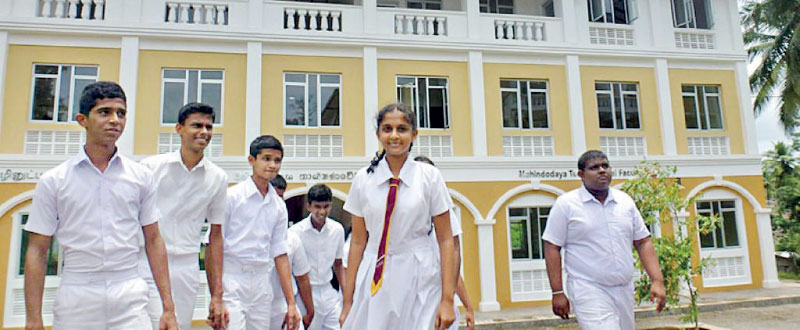Saturday Feb 21, 2026
Saturday Feb 21, 2026
Monday, 8 September 2025 01:37 - - {{hitsCtrl.values.hits}}
“In this world, nothing is certain except death and taxes”

The solution is clear, simple, and revolutionary: integrate age-appropriate tax education into our school curricula
 magine they would still ring so true centuries later. At first glance, the line may seem like a clever remark. But it holds a deeper truth: taxes much like death are a universal part of life. Inevitable, often misunderstood, and sometimes dreaded, taxes quietly power the engines of society. They fund the roads we drive on, the hospitals we depend on, the schools that shape our future, and the safety nets that protect the most vulnerable.
magine they would still ring so true centuries later. At first glance, the line may seem like a clever remark. But it holds a deeper truth: taxes much like death are a universal part of life. Inevitable, often misunderstood, and sometimes dreaded, taxes quietly power the engines of society. They fund the roads we drive on, the hospitals we depend on, the schools that shape our future, and the safety nets that protect the most vulnerable.
Even though taxes are important, many people still find them confusing and hard to understand. Learning how taxes work is the first step to building a fairer and stronger future for everyone. Unlike death, which we must simply accept, taxes are something we can learn about, plan for, and even view positively if we’re given the right knowledge. That’s why tax education shouldn’t be left to chance; it should start early in life and continue throughout every stage.
Why Franklin’s words still matter today
Benjamin Franklin understood a basic truth that still holds: no country can function without taxes. Taxes, in many ways, are the glue that keeps society running. And just as we accept the laws of nature, we must also learn to live with and contribute to our tax systems. But here’s the challenge: while taxes touch everyone’s life, understanding them is surprisingly rare. Studies show that many adults struggle to explain basic tax concepts, like the difference between direct and indirect taxes, or how governments collect and use revenue. The gap is even wider among young people, especially in places where civic education is lacking. If taxes are certain, shouldn’t understanding them be just as certain?
Bridging the tax education gap
In many parts of the world especially in developing regions tax systems are often seen as confusing, unfair, or even corrupt. This perception breeds mistrust and encourages people to avoid paying taxes. But in most cases, it’s not bad intent it’s a lack of understanding. People naturally mistrust what they don’t fully grasp, and taxes, with their technical language and procedures, can seem overwhelming.
That’s why tax education is essential not just as a financial skill, but as a pillar of civic life. It’s more than teaching people to file returns; it’s about helping them see how they contribute to the country’s development. Just as global efforts in environmental education promote sustainability, tax education builds a culture of fairness, accountability, and national responsibility. Like any lasting habit, it should start early beginning in early childhood, when values are first shaped and minds are open, curious, and ready to learn.
Youth: The taxpayers of tomorrow
Imagine a young freelance designer, fresh out of school, earning money online but clueless about how or even if she should pay taxes. Or a budding farmer, eager to grow his business, completely unaware of the government incentives designed to help him. These aren’t just hypothetical scenarios; they’re the everyday reality for countless young Sri Lankans entering the workforce. Our future taxpayers; today’s students, innovators, and leaders, are graduating into adulthood ill-equipped for a fundamental aspect of civic life: understanding how their nation is funded. This isn’t because our tax system is overly complicated; it’s because we’re failing to provide them with the basic knowledge to engage with it confidently.
This knowledge gap isn’t just about collecting revenue; it’s about fostering active citizenship and economic empowerment. When young people understand the direct link between their taxes and the roads they drive on, the schools they attend, or the healthcare they receive, taxation transforms from a confusing burden into a tangible contribution to their community and country. The solution is clear, simple, and revolutionary: integrate age-appropriate tax education into our school curricula. Introducing clear financial concepts at the secondary school level and exploring complex tax and fiscal issues in universities will help equip young people with the knowledge needed to become financially informed and responsible citizens.
Creative pathways for youth tax education
Beyond dusty textbooks and droning lectures, imagining tax education as an engaging and even exciting journey can transform how young people view their contribution to society. We can revolutionise learning with:
“Budget Battle” game apps
Students can learn by playing! In this game, they try to manage a country’s budget deciding how to spend money, collect taxes, and keep the economy running. It’s a fun way to understand real-life financial decisions.
“Fiscal Role-Play in Classrooms”
Imagine a classroom where students act as government leaders, small business owners, or everyday citizens. They discuss tax problems and try to find fair solutions. This helps them understand how tax works from different points of view.
“Tax Tales” cartoons and videos
Taxes can be confusing, but cartoons and simple videos can explain them through fun stories. Kids can follow characters who show how taxes help schools, hospitals, and roads making big ideas easier to understand.
“Tax for Good” school projects
Let students come up with their own ideas! In these projects, students can design ways to use tax money for things like health care, clean water, or the environment. It teaches them that taxes are not just rules but tools for building a better future.
By making taxes easier to understand and showing why they matter through fun, hands-on learning we can help people see taxes not as a burden, but as a way we all work together to build a better country. It’s about changing the story: taxes aren’t just rules to follow, they’re part of a smart partnership between people and government. Just like reading or writing, knowing how money and taxes work is a skill everyone needs to succeed in today’s world.
Tapping into a hidden resource: Why our elders hold the key to tax understanding
While much attention rightly focuses on educating our youth about taxation, we often overlook a goldmine of knowledge right in our communities: our elders. These seasoned citizens possess decades of firsthand experience navigating tax systems through their careers, businesses, farming, or even international migration. Yet, their invaluable insights are rarely part of public tax education efforts.
This is a significant missed opportunity. Imagine retirees, with their deep understanding of how taxes have shaped lives and livelihoods over generations, serving as mentors in community-based tax programs. They could share real-life stories about how tax laws impacted their families, businesses, or retirement plans, making abstract concepts relatable and grounding tax knowledge in local realities. This not only validates their wisdom but also creates a powerful, intergenerational learning experience.
Furthermore, as life expectancy rises and tax regulations evolve, older citizens frequently face new complexities in areas like pension taxation, healthcare costs, and property taxes. Providing them with updated information is crucial for informed financial decision-making in their later years. So that, understanding taxation isn’t just a lesson for the young; it’s a continuous civic necessity. By recognising and integrating the lived experiences of our elders, we can enrich tax literacy across all age groups, fostering a more informed and engaged society for everyone.
New social contract through tax literacy
We must recognise that financial penalties and audits are too late for true engagement; by then, the damage of disengagement is already done. Instead, a proactive investment in tax knowledge is as vital as public health or disaster preparedness. This isn’t merely about teaching individuals to fill out forms; it’s about forging a profound new social contract. Imagine a future where people see paying taxes not as a heavy burden, but as a powerful way to shape the country’s future together a meaningful contribution to the nation we all share. This vision hinges on cultivating tax systems that are inherently fair, refreshingly simple, and genuinely inclusive. It means nurturing a generation of young people who don’t just cast votes but actively demand fiscal accountability in budget debates, and empowering elders to reflect on their lifelong tax contributions with pride, not resentment. The path forward is clear: embed comprehensive tax education into school curricula, launch dynamic public awareness campaigns across all media, engage youth with innovative tech-driven tools, leverage the wisdom of elders as mentors and dialogue partners, and rigorously strengthen transparency in public spending to solidify the crucial link between tax payments and tangible public services. This strategic investment in knowledge is the bedrock upon which a truly democratic, resilient, and accountable society is built, ensuring every citizen understands and values their role in collective prosperity.
Final thoughts: Reshaping our relationship with taxation
While Benjamin Franklin famously linked death and taxes as life’s only certainties, he left unspoken a crucial truth: our interaction with these inevitabilities is within our control. Just as we actively shape our lives despite the certainty of mortality, we possess the agency to transform our understanding, education, and application of taxes. This isn’t about escaping taxation, but about reimagining its role. Let’s shift the way we think about taxes from something we fear or avoid to something we’re proud of. Taxes can be more than payments; they can become a powerful symbol of unity and progress. They’re how we all chip in to build a fairer, smarter, and more caring society one that lifts up every citizen, from curious children to wise elders.
(The writer is Deputy Commissioner General at the Inland Revenue Department.)